Weekly Market Commentary December 19 2024
The Markets
The Bank of Canada's interest rate reductions have propelled the Canadian stock markets to an incredible surge in 2024. Because investors are still hopeful about the long-term effects of the interest rate cuts, the main stock index, the Toronto Stock Index, has increased roughly 20% this year.
Better global growth, interest-rate-sensitive businesses, and interest-rate- sensitive dividends have been the three main factors. For the two years that rates were rising, these were headwinds, but they have since turned into tailwinds. While valuations in the US stock markets appear overstretched, the Canadian market is still attractively priced and spots a very handsome dividend yield for investors.
Stock market strategists are cautiously optimistic that the rally will continue because the central bank is anticipated to keep lowering interest rates to boost the economy. According to Brent Joyce, chief investment strategist at BMO, the climate is very favorable for stocks.
Many companies on the Toronto Stock Exchange are cyclically oriented, which means that they are reliant on the business cycle and the economy for their marginal success. Similarly, stable growth in the south has benefited Canadian equities because of the close economic ties between the US and Canada.
On the other hand, Donald Trump, who will take office on January 20, is emerging as the center of attention for Corporate Canada. The U.S. president-elect is already making waves in the business community. When Trump threatened to impose massive tariffs unless Canada and Mexico stopped the flow of illegal drugs and migrants into the U.S., it sent Canadian politicians reeling.
The tariffs would seriously harm the nation's most vital trading partnership. According to iA Global Asset Management chief strategist Sébastien Mc Mahon, the first 30 days of Trump's second term will determine the course of events.
Canada's main stock index, the TSX, has been on a roll, hitting record highs of 25,000 points for the first time and setting new trading records. Most of the gains in the second half of the year were attributed to the Bank of Canada interest rate-cutting spree.
Nevertheless, the upward momentum in the Canadian equity markets is slowly waning. The main stock index fell the most to two-week lows as investors reacted to lower commodity prices. A supersized interest rate cut by the Bank of Canada also appears to have spooked the market instead of quelling uneasiness about domestic economic prospects.
Bank of Canada cutting interest rates by 50 basis points to 3.25% rattled the market, signaling weaker expected economy in Canada. In addition, uncertainty is slowly creeping into the market amid fears that Donald Trump would impose 25% tariffs on Canadian imports. Key minerals and metals are goods that the United States depends on, and some Canadian premiers are calling on Ottawa to react forcefully to the threat of tariffs from incoming U.S. President Donald Trump.
How high can U.S. stocks fly?
The U.S. stock market has delivered exceptional performance over the past few years and remains on track to deliver solid returns in 2024.
“It isn’t a secret that U.S. stocks have outperformed the rest of the world. Over the past decade, the S&P 500 returned 13 [percent] a year on average,* compared with less than 5 [percent] for the MSCI EAFE [Europe, Australia, and Far East] index of developed countries. Investors can thank the health of the U.S. economy and the remarkable growth of the tech sector. The downside: U.S. stocks now trade more than 21 times earnings, compared with less than 14 for international ones…” reported Ian Salisbury of Barron’s.
In recent weeks, though, the stock market appears to have lost some steam. While Magnificent Seven technology stocks have pushed higher, many other stocks have moved lower. On Thursday, Geoffrey Morgan of Bloomberg reported, “The S&P 500 Index closed out its ninth consecutive day where the number of constituents falling outnumbers those rising. That’s [the] longest such streak since Bloomberg started collecting the data in 2004. The development signals that the foundation of the stock- market rally is weakening, with strength in technology high-flyers offsetting softness everywhere else.”
As the end of the year approaches, major U.S. stock indices are near record highs. U.S. Equity Strategist Mike Wilson, who is optimistic about the outlook for the U.S. stock market, told the hosts of Bloomberg Open Interest that investors should be prepared for some uncertainty and volatility and, possibly, a stock market correction.
A correction occurs when the stock market drops by more than 10 percent, and by less than 20 percent, from its recent peak. While corrections are uncomfortable for investors, they tend to wring out irrational exuberance and ring in more reasonable share price valuations, reported James Chen of Investopedia.
Last week, the Nasdaq Composite Index, which is heavily weighted in technology stocks, passed 20,000 for the first time. The Nasdaq finished the week higher, while the Standard & Poor’s 500 Index and Dow Jones Industrial Average moved lower. Concerns that sticky inflation might lead the Federal Reserve to pause its rate-lowering cycle pushed the yield on the benchmark 10-year U.S. Treasury lower last week, reported Sinéad Carew and Harry Robertson of Reuters.

Source: FactSet
WHAT’S IN A WORD? Dictionaries and publications have begun to share their “Word of the Year.” For 2024, Merriam-Webster Dictionary chose “polarization,” which is defined as “division into two sharply distinct opposites; especially, a state in which the opinions, beliefs, or interests of a group or society no longer range along a continuum but become concentrated at opposing extremes.” Here are some other notable words of the year:
- Manifest was at the top of the list for the Cambridge Dictionary. “When famous performers, star athletes, and influential entrepreneurs claim they have achieved something because they manifested it, they are using this verb in a more recent sense: to use specific practices to focus your mind on something you want, to try to make it become a reality.”
- Brain rot took the prize as Oxford University Press’s word of the year. Brain rot is the “supposed deterioration of a person’s mental or intellectual state, especially viewed as a result of overconsumption of material (now particularly online content) considered to be trivial or unchallenging.
- Demure was plucked from the crowd by Dictionary.com. For many years, demure was a compliment given to young women for being modest and reserved. In 2024, a content creator used it “humorously in a way that appeared to challenge and poke fun at widespread societal expectations of how women are supposed to look and behave,” reported Leslie Katz for Forbes.
- Allision was one of Merriam Webster’s runner-up words of the year. An allision occurs when a ship runs into a stationary object. The difference between “collision” and “allision” became more widely known after a cargo ship hit Baltimore’s Francis Scott Key Bridge causing it to collapse.
In general, media stories, headlines, social media trends, and online search results help determine publications’ short lists for Word of the Year. Runner-up words for 2024 included totality, democracy, pander, brat, ecotarian, romantasy, dynamic pricing, slop, extreme weather, and resilience.
What is your choice for word of the year?
Weekly Focus – Think About It
“Language is the blood of the soul into which thoughts run and out of which they grow.”
—Oliver Wendell Holmes, Supreme Court Justice
Best regards,
Eric Muir
B.Comm (Hons. Finance), CIM®, FCSI
Senior Portfolio Manager
Derek Lacroix
BBA, CIM®, CFP®
Associate Portfolio Manager

P.S. Please feel free to forward this commentary to family, friends or colleagues. If you would like us to add them to the list, please reply to this email with their email address and we will ask for their permission to be added.
Disclaimer:
Information in this article is from sources believed to be reliable, however, we cannot represent that it is accurate or complete. It is provided as a general source of information and should not be considered personal investment advice or solicitation to buy or sell securities. The views are those of the author, Eric Muir and Derek Lacroix and not necessarily those of Raymond James Ltd. Investors considering any investment should consult with their Investment Advisor to ensure that it is suitable for the investor’s circumstances and risk tolerance before making any investment decision. Raymond James Ltd. is a Member Canadian Investor Protection Fund.

